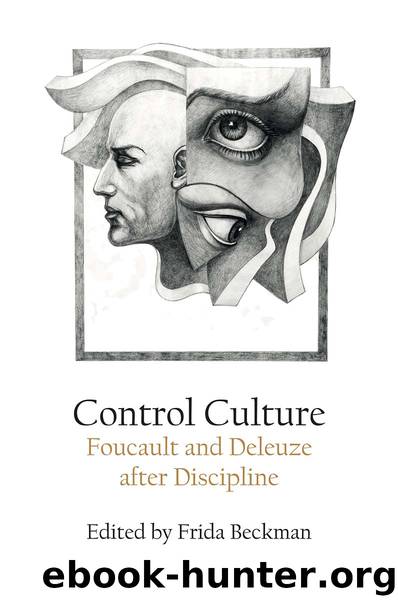Control Culture: Foucault and Deleuze After Discipline by Frida Beckman

Author:Frida Beckman [Beckman, Frida]
Language: eng
Format: epub
Tags: Philosophy, History & Surveys, Modern
ISBN: 9781474436786
Google: cJXdvQEACAAJ
Amazon: B07JZGVRR2
Publisher: Edinburgh University Press
Published: 2018-01-15T01:12:50.110000+00:00
CHAPTER 7
Cinema in the Age of Control
Gregory Flaxman
THE TABLE OF INFORMATION AND THE SOCIETY OF CONTROL
On the face of it, the coupling of cinema and ‘control society’ is bound to seem awkward, perhaps even counterintuitive. Neither term is particularly easy to define, but their combination seems to fly in the face of manifest associations on both sides. Whereas the etymological and technical origins of cinema belong to an older pictorial, physiological and photomechanical history, control is inconceivable apart from the invention of a new generation of digital machines. In his ‘Postscript on Control Society’ (1990), the short essay which effectively launched the eponymous concept, Gilles Deleuze insists that ‘information technology and computers’ underwrite the emergence of our postdisciplinary regime of power (Deleuze 1995: 180). Thus, ‘control’ describes a political economy, a biopolitics and an episteme – with the understanding that the digital revolution transforms these categories in turn.
By these standards, cinema seems an anachronism. Media studies scholars have long argued that the so-called Seventh Art, often cast as the great mass medium of the twentieth century, actually culminates a technological lineage firmly entrenched in the opto-photo-mechanical tradition of the nineteenth century.1 If anything, then, cinema demonstrates a tenacious capacity to adapt to the new era of electricity (by automating the camera, projector and even editing table, no less by embracing artificial light and the introduction of synchronised sound). For scholars like Friedrich Kittler, the wonder is that the cinema persists as long as it has, even surviving the challenge posed by the introduction of television, the electronic medium par excellence. The same cannot be said with respect to the digital age. Over the past twenty-five years, audio-visual ‘entertainment’ has been so profoundly – we might even say, existentially – transformed by new media and digital communications as to outstrip the material origins of ‘film’ (the celluloid or cellulous acetate film strip) and ‘cinema’ (the cinematographic machine). When we go to the movies, the film itself is increasingly shot digitally, quite possibly distributed digitally, and in all likelihood projected digitally. Moreover, the viewing experience itself is no longer reducible to the model of the movie-goer: we watch on televisions, PCs, tablets, phones, watches; we gaze at screens on refrigerators and gas pumps, in waiting rooms and aeroplanes. Finally, as if anyone need be told, the ostensible differences between cinema, television, and online entertainment are swiftly dissolving. No longer discrete media, all three are now contingent on digital information that exists irrespective of any single format: the device is contingent and the medium secondary before the all-encompassing abstraction of digital ‘content’.
To put it bluntly, we’re well past the point of adhering to a ‘specificity thesis’ of the cinema: the literality of film, the sensitive substance on which light was recorded (‘like a decal’, as Bazin said2), has been overwhelmingly replaced by the far less expensive means of digitally recording, animating, manipulating, storing and delivering audio-visual information. Has there been a moment in the past century of cinema as uncertain as our own,
Download
This site does not store any files on its server. We only index and link to content provided by other sites. Please contact the content providers to delete copyright contents if any and email us, we'll remove relevant links or contents immediately.
| Coloring Books for Grown-Ups | Humor |
| Movies | Performing Arts |
| Pop Culture | Puzzles & Games |
| Radio | Sheet Music & Scores |
| Television | Trivia & Fun Facts |
Everybody Lies by Seth Stephens-Davidowitz(1705)
You're Not Listening by Kate Murphy(1626)
Sex, Drugs, and Cocoa Puffs by Chuck Klosterman(1277)
The American Scene by Henry James(1253)
The Attention Merchants by Tim Wu(1245)
Empire of Illusion by Chris Hedges(1228)
Simulacra and Simulation by Jean Baudrillard(1221)
The Caped Crusade by Glen Weldon(1110)
The House of Kennedy by James Patterson(1108)
Sense of Wonder by Bill Schelly(1082)
Predictably Irrational by Dan Ariely(1040)
Fast Food Nation by Eric Schlosser(1034)
The 50th Law by 50 Cent & Robert Greene(1010)
Free Women, Free Men by Camille Paglia(961)
What the Dog Saw: And Other Adventures by Malcolm Gladwell(919)
At Home by Bill Bryson(912)
Thank You for Arguing (Revised and Updated) by Jay Heinrichs(883)
Need to Know by Timothy Good(874)
Propaganda by Edward L. Bernays(866)
